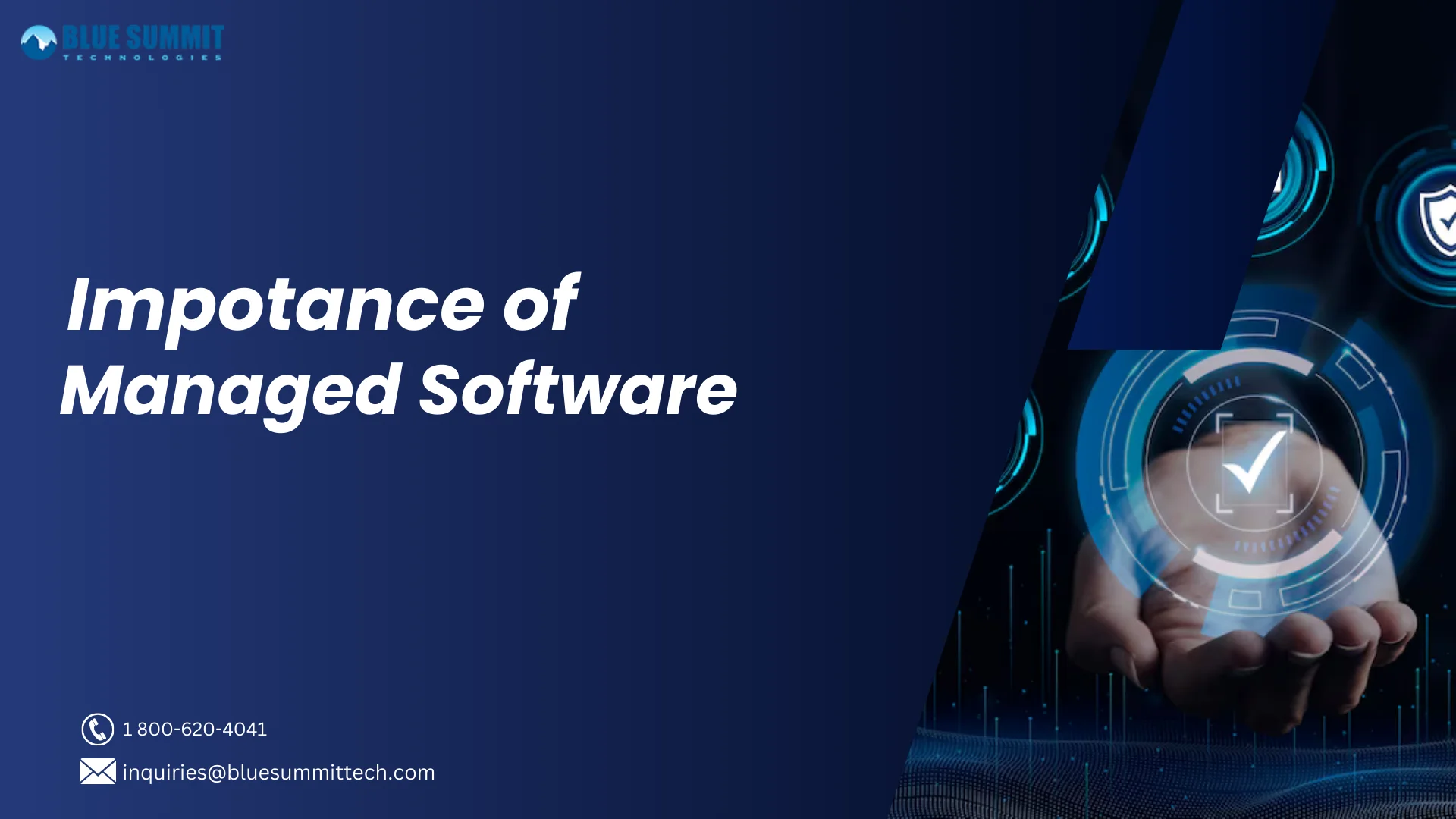
Posted on Tuesday, Jun 25th, 2024
Managed Services Support and Solution
Managed services software is an important tool for maximizing IT service, which includes improved operational effectiveness and strategic focus for the rapidly evolving business world. Utilizing managed IT services has become essential for enterprises navigating complex IT environments and changing cybersecurity threats. These services allow businesses to delegate important IT tasks to knowledgeable providers known as Managed Service Providers (MSPs), including infrastructure management, cybersecurity, and data backup. This strategic outsourcing unlocks a wealth of managed IT services benefits, such as streamlined operations, enhanced cybersecurity defences, ensured data integrity, and optimized IT resources. Businesses that partner with MSPs can focus on innovation and core goals while benefiting from advanced technologies and proactive support provided by managed services.
Importance of managed service in today's environment
In today's fast-paced and technology-driven business environment, the importance of managed services cannot be overstated. As organizations strive to remain competitive and efficient, the complexity of managing IT infrastructure, ensuring cybersecurity, and keeping up with rapid technological advancements presents significant challenges. Managed services offer a strategic solution by allowing businesses to outsource these critical functions to specialized third-party providers. This enables organizations to focus on their core competencies and strategic initiatives while leveraging the expertise, resources, and advanced technologies of managed service providers (MSPs).Purpose and Uses of Managed Services Software
In contemporary business operations, the purpose of managed services, particularly in the domain of IT, serves as a pivotal strategy to enhance organizational efficiency and strategic focus. Managed services involve outsourcing specific business processes to expert third-party providers who offer specialized skills and resources. This approach allows companies to offload the complexities of managing IT infrastructure and applications, enabling them to concentrate on core business objectives and innovation.Key Uses of Managed Services Software
1. IT Infrastructure Management
Managed services are used for the proactive management and maintenance of IT infrastructure, including servers, networks, and storage systems. This ensures high availability, reliability, and performance. MSPs continuously monitor systems to detect and resolve issues before they impact operations, reducing downtime and enhancing the overall efficiency of IT environments.2. Cybersecurity Enhancement
MSPs provide comprehensive cybersecurity services through managed services software, offering advanced threat detection, vulnerability assessments, and incident response capabilities. This helps protect sensitive data and critical systems from cyber threats. Continuous monitoring and proactive security measures ensure that businesses can respond swiftly to potential breaches, reducing the risk of data loss and maintaining regulatory compliance.3. Cloud Computing Support
With the increasing adoption of cloud services, managed services software supports the efficient management of cloud infrastructure. This includes data storage, application deployment, and service integration. MSPs ensure optimal use of cloud resources, seamless operations, and cost-effective scalability. Businesses benefit from the flexibility and efficiency of cloud environments without the complexities of managing them in-house.4. Data Backup and Recovery
Managed services software provides robust data backup and recovery solutions, ensuring that critical business data is regularly backed up and can be quickly restored in case of data loss or system failure. MSPs implement reliable backup strategies and perform periodic data recovery tests. This minimizes downtime and mitigates risks associated with data breaches, hardware failures, or other unforeseen events, ensuring business continuity.5. Network Management
MSPs use managed services software for continuous network monitoring, configuration management, and performance optimization. This ensures stable and secure network operations, preventing disruptions and maintaining optimal connectivity. By proactively addressing network issues and optimizing performance, businesses can enhance productivity and avoid costly downtimes, ensuring seamless communication and data flow across the organization.6. Unified Communications
Managed services facilitate unified communications by integrating various communication tools such as VoIP, video conferencing, and instant messaging. This enhances collaboration and productivity, especially in remote and distributed work environments. MSPs ensure that communication systems are reliable, secure, and seamlessly integrated, enabling efficient and effective communication across teams and improving overall business operations.Role and responsibility of a Managed IT service
Managed IT services play a pivotal role in modern businesses by providing comprehensive management and support for a company’s IT infrastructure. These services allow organizations to outsource their IT operations to expert providers, ensuring that their technology systems are maintained, secure, and up-to-date. Managed IT service providers take on a variety of responsibilities, including network management, cybersecurity, data backup and recovery, and technical support. This approach allows businesses to focus on their core operations while leveraging the expertise and advanced solutions offered by managed services.Here are the key roles and responsibilities of managed IT services:
1. Network Management and Monitoring
Managed IT service providers continuously monitor a company’s network to ensure optimal performance and security. They use advanced managed services technology to detect and address potential issues before they escalate into major problems. This proactive approach helps in minimizing downtime and maintaining a smooth workflow within the organization.2. Cybersecurity and Data Protection
One of the critical responsibilities of managed IT services is to safeguard the organization’s data against cyber threats. Managed services support includes implementing robust security measures, such as firewalls, anti-virus software, and intrusion detection systems. Regular security audits and vulnerability assessments are conducted to identify and mitigate risks, ensuring data integrity and compliance with industry regulations.3. Data Backup and Disaster Recovery
Managed IT services ensure that all business-critical data is backed up regularly and can be recovered quickly in the event of a disaster. This includes developing and maintaining a comprehensive disaster recovery plan that outlines the steps to restore operations with minimal disruption. Managed services solutions provide peace of mind by ensuring data availability and resilience against data loss incidents.4. Helpdesk and Technical Support
Providing timely and effective technical support is a cornerstone of managed IT services. A dedicated helpdesk team is available to resolve IT-related issues, ranging from software glitches to hardware failures. This managed services support ensures that employees can remain productive by addressing their IT problems efficiently, reducing downtime and frustration.5. IT Infrastructure Management
Managed IT service providers are responsible for the overall management of a company’s IT infrastructure. This includes routine maintenance, software updates, and hardware management. By leveraging managed services technology, they ensure that all systems are running efficiently and are aligned with the latest technological advancements. This not only enhances performance but also extends the lifespan of IT assets.6. Strategic IT Planning and Consultation
Beyond daily operations, managed IT service providers offer strategic planning and consultation services. They work closely with businesses to understand their goals and align IT strategies accordingly. This involves recommending and implementing managed services solutions that drive business growth and innovation. Their expertise helps businesses stay ahead of technological trends and make informed decisions about IT investments.7. Cost Management and Predictability
Managed IT services provide a predictable cost structure for businesses. Instead of facing unexpected expenses from IT issues, companies pay a fixed monthly fee for managed services support. This model helps in budgeting and financial planning, ensuring that IT costs are manageable and transparent. Additionally, it often leads to cost savings by reducing the need for in-house IT staff and minimizing downtime-related losses.Conclusion
managed services software stands as a cornerstone in modern business operations, addressing critical IT challenges and enhancing organizational resilience. By outsourcing IT functions to expert providers, businesses streamline operations, bolster cybersecurity, and ensure continuous access to advanced technologies. This strategic approach not only optimizes efficiency and performance but also allows companies to focus resources on core objectives, fostering innovation and sustained growth in a dynamic digital landscape.For businesses seeking comprehensive IT solutions, Blue Summit offers a broad range of managed services, including onsite and remote support, system monitoring, and system management.
Blue Summit has collaborated with OdiTek Solutions, a frontline custom software development company. It is trusted for its high service quality and delivery consistency. Visit our partner's page today and get your business streamlined.
REFER TO OTHER RELEVANT CONTENTS

Managed Services Support and Solution
Managed services software is an important tool for maximizing IT service, which includes improved operational effectiveness and strategic focus for the rapidly evolving business world. Utilizing managed IT services has become essential for enterprises navigating complex IT environments and changing cybersecurity threats. These services allow...
read more








